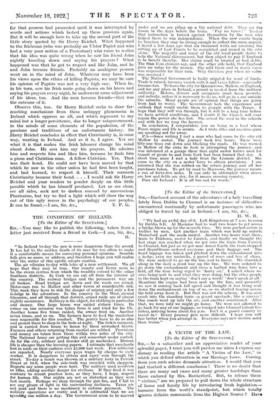R.
" In Ireland to-day the pen is more dangerous than the sword. It has led to the sudden death of its user far too often to make it a comfortable means for conveying personal opinions. Sensible folk give no name or address, and therefore I hope you will realize why the writer of this epistle adopts caution.
The air vibrates to-day with tales of a near settlement. We all hope that they may be true. Our county and Kerry seem to be the storm centres from which the troubles extend to the other Southern districts. In Cork we are cut off from the interior of the country. The railway bridges and the permanent way are all broken. Road bridges are down and the roads are mined. Motor-cars run to Mallow and other towns at considerable risk. This week they have to risk the danger of sniping, and only a few indulge in the adventure. In the country to the West, around Glanmire, and all through that district, armed raids are of almost nightly occurrence. Robbery is the object, for clothing in particular and money. One large house was raided sixteen times. Its owner on one occasion was taken from it and tried for his life. Another house five times raided, the owner fired on. Another seven times, and so on. The farmers have to feed the masterless men responsible for this conduct. The gentry have to do so also and permit them to sleep in the beds at night. The itch is rampant, and is carried from house to house by these unwashed beasts. ;Farmers and others returning from market are robbed. Provisions and money are taken from them within two miles of the city. 'The National Army are getting this evil somewhat under control. As for the city, robbery and murder still go unchecked. Human life is cheaper than the morning papers. I estimate that merchants lost in raids on their cashiers over £1,000 last week. Few robberies are reported. Nearly everyone pays wages by cheque to each ,worker. It is dangerous to obtain and carry coin through the street. To-day a bomb was thrown at a military lorry in Patrick Street at 10.6, when the side-walk was crowded with shoppers. Reports say some people were hurt. The military used revolvers or rifles, adding another danger for civilians. If they fired it was contrary to recent practice here, as they have, I hope, respect for human life. Our nights are not as disturbed as they were last month. Perhaps we sleep through the gun fire, and I fail to see any gleam of light in the surrounding darkness. Taxes are not paid and there is no machinery to enforce payment. The military operations are costly and it is estimated that we are spending one million a day. The Government seem to be snowed under and we are piling up a big national debt. They set the lesson in the days before the truce. Pay no taxes V To-day that instruction is turned against themselves by the men who helped them to win independence. When the new courts begin to function they may be strong enough to collect the sums unpaid. I heard a few days ago that six thousand writs are awaiting the setting up of Law Courts to be completed and issued in the city alone. The majority and many of the old loyal people desire to help the National Government, but they object to pay if England is to benefit thereby. Her claims must be treated as bad debts. The Sinn Fein element say, and the other side hold, that England gave no value for the money. She sold them and in many cases was responsible for their ruin. Why therefore pay when no value was received ?
The National Government is badly crippled for want of funds. Trade is ruined, incomes vanish with it and taxes follow—especially Income-tax. To leave the city for Queenstown, Mallow, or England, and for any place in Ireland, a permit is needed from the military authority. Motors, drivers and occupants must have permits, and nobody, unless it is necessary to do so, will go in a car outside the suburbs. Many people are of opinion that things are going from bad to worse. The Government lack the experience and outlook that would enable them to grapple with the Terror. I hope that they will win through, but it will be a long time before we have settled conditions, and I doubt if the Church will ever regain the power she has lost. She sowed the seed in the schools and with her we reap the harvest. In conclusion, I congratulate you on being in a land where Peace reigns and life is secure. As I write rifles and machine-guns are speaking not far away. P.S.—Since writing I met a man who had come to the city yid Mallow by motor. The journey took five hours. There were fifty-one trees cut down and blocking the roads. He was warned in Mallow of the risks he took in attempting the journey, and was informed at a garage there that eight motor lorries used for transit of goods to and from Cork had been burned that day. A short time since I met a lady from the Lismore district. She came to the city on a motor lorry to obtain provisions. I ant informed that she was robbed on the return journey and all her purchases taken. To get by road to Macroom, the journey means a run of forty-five miles. It can only be attempted when rivers arc low and fields are dry, for it means crossing country.
Poor old Ireland I It is all too sad for words."






































 Previous page
Previous page